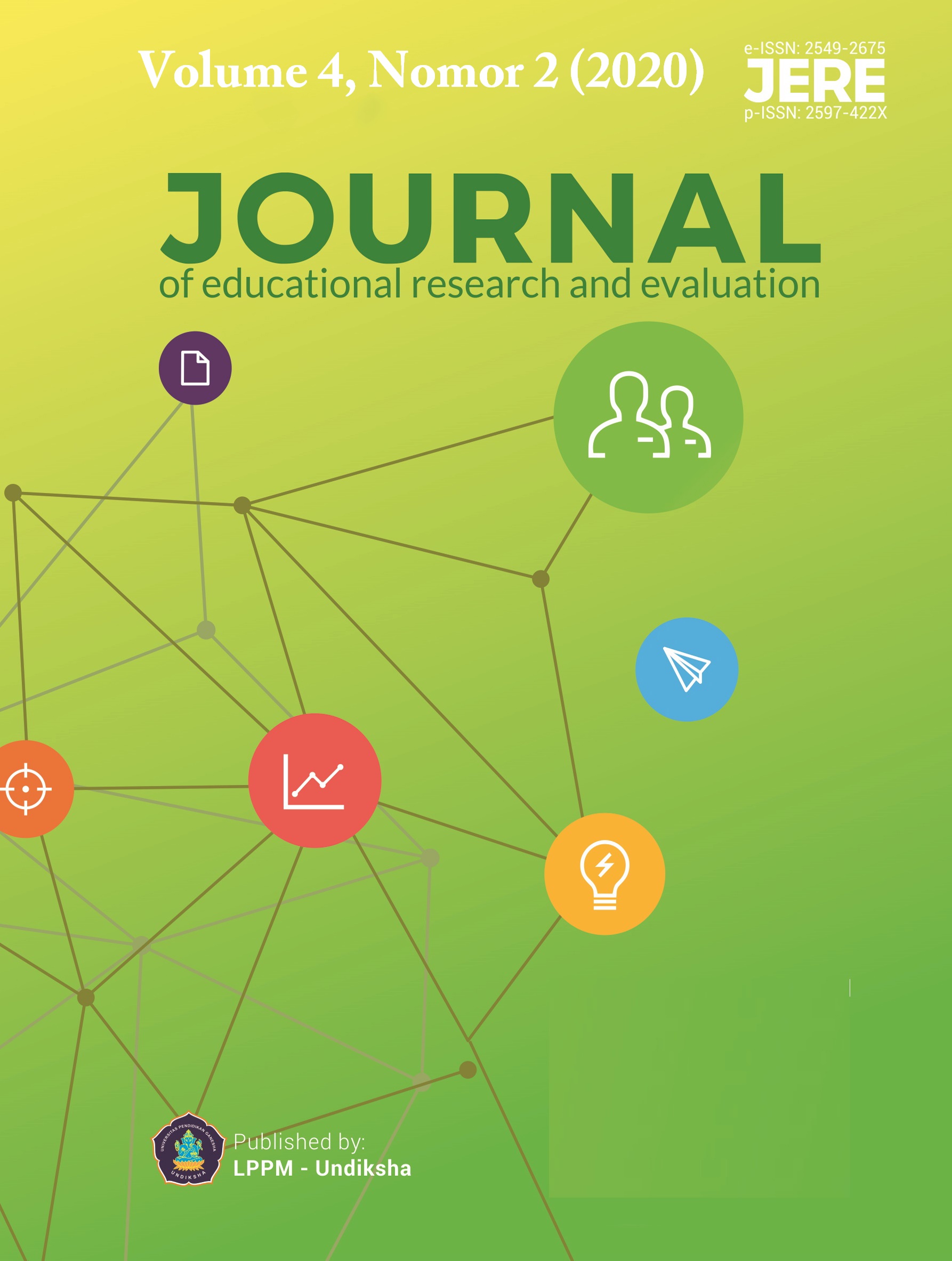The Development of Program Logic Control (PLC) Trainer Media in Vocational High Schools
DOI:
https://doi.org/10.23887/jere.v4i2.24606Keywords:
Trainer PLC, IMLAbstract
This study aimed to develop the Program Logic Control ( PLC ) media. The validity, practicalities, and effectiveness, can be used as a media of teaching in schools on subjects IML. The method used was Research and Development (R&D) with the 4-D model of developing procedure. The subjects in this study were students of SMK Negeri 5 Batam, the technical data analysis obtained from 5 experts. Analysis of the data used to measure the validity, practicality, and effectiveness by looking at the difference between the average score of learning scores before and after using the trainer with Gain Score and Standard Deviation. The results of the study met the instructional media qualifications from the assessment of experts with a level of 0.88 stated in the valid category. In practicality based on the teacher's response was 92.00% and on the student, responses were 90.50%. Effectiveness is obtained from the results of the pretest with an average score was 59.63%, from the results of the posttest with an average score of 79.63%, the N-gain of the average student was 0.37 and the standard deviation from N -gain was 0.52. So, PLC trainers are valid, practical, and effective in learning at school. The PLC media trainer can be used in the learning process at school.
References
Abdul R. (2012). Deskripsi Sekolah Menengah Kejuruan. (Online). (http://eprints.uny.ac.id/8459/3)
Adi, Agung Nugroho. (2010). Mekatronika. Yogyakarta : Graha Ilmu
Ahmad Rivai dan Nana Sudjana. 2005. Media Pengajaran. Bandung: Sinar Baru Algesindo
Anderson, A, (1994) Pemilihan dan pengembangan media untuk pembelajaran, Jakarta : PT.Raja Grafindo Persada
Ariani, Niken. Dan Haryanto, Dany. 2010. Pembelajaran Multimedia di Sekolah. Jakarta: Prestasi Pustaka.
Arianto, T. (2020). Pengembangan Trainer Programmable Logic Control ( PLC ) Berbasis Microcontroller untuk Siswa SMK N 1 Bukittinggi. Journal of Multidicsiplinary Research and Development, 2(2), 105–110.
Arsyad, Azhar. (2013). Media Pembelajaran Edisi Revisi. Jakarta: PT. Raja Grafindo Persada.
Azwar, Saifuddin (2014). Metode Penelitian. Yogyakarta: Pustaka Pelajar.
Barret, M. (2008). THE DESIGN OF A PORTABLE PROGRAMMABLE LOGIC CONTROLLER ( PLC ) TRAINING SYSTEM FOR USE OUTSIDE OF THE AUTOMATION LABORATORY. 1–5.
Cahyanto, A. (2014). PENGEMBANGAN MEDIA PEMBELAJARAN MENGGUNAKAN PLANT VIRTUAL 3D MATA KULIAH PROGRAMABLE LOGIC CONTROL ( PLC ). 1.
Djamarah, Syaiful Bahri dan Aswan Zain. 2010. Strategi Belajar Mengajar. Jakarta: Rineka Cipta.
Fauza, M. A. A. (2020). Pengembangan Trainer Programmable Logic Controller ( PLC ) dan Elektropneumatik untuk Siswa SMK N 1 Bukittinggi. Journal of Multidicsiplinary Research Andh Development, 1(2), 87–92.
Hamalik, Oemar. 2008. Proses Belajar Mengajar. Jakarta: Bumi Aksara.
Isjoni. (2010). Cooperative Learning (Efektivitas Pembelajaran Kelompok). Bandung: Alfabeta.
Obermeier, M., Braun, S., Vogel-heuser, B., & Member, S. (2015). A Model-Driven Approach on Object-Oriented PLC Programming for Manufacturing Systems with Regard to Usability. IEEE Transactions on Industrial Informatics, 11(3), 790–800. https://doi.org/10.1109/TII.2014.2346133
Paul Suparno. 1997. Filsafat Konstruktivisme Dalam Pendidikan. Yogyakarta: Kanisius
Park, C. M., Bajimaya, S. M., Park, S. C., & Wang, G. N. (2006). Development of Virtual Simulator for Visual Validation of PLC Program. 1–5.
Republik Indonesia. (1990). Peraturan Pemerintah Republik Indonesia Nomor 29 Tahun 1990 tentang Pendidikan Menengah. Jakarta: Sekretaris Negara Republik Indonesia.
Republik Indonesia. (2003). Undang-Undang Republik Indonesia Nomor 20 Tahun 2003 tentang sistem Pendidikan Nasional. Jakarta: Sekretaris Negara Republik Indonesia.
Riera, B., Benlorhfar, R., Annebicque, D., Gellot, F., & Vigario, B. (2011). Robust control filter for manufacturing systems : application to PLC training. IFAC Proceedings Volumes, 44(1), 14265–14270. https://doi.org/10.3182/20110828-6-IT-1002.01976
Salafuddin, M. & Ananta, H. 2013. Implementasi Sistem Manajemen Keselamatan dan Kesehatan kerja di PT PLN (Persero) Area Pengatur Distribusi Jawa Tengah & D.I.Yogyakarta dalam Upaya Peningkatan Mutu dan Produktivitas Kerja Karyawan. Jurnal Teknik Elektro Volume, 5(1), Universitas Negeri Semarang
Sarwono, I. E., & Ananta, H. (2018). Pengembangan Trainer Programmable Logic Control (plc) s7-1200 sebagai Media Pembelajaran Instalasi Motor Listrik di SMK. 41(2), 147–153.
Sudarto, G., Ma, M., & Kusuma, H. O. (2019). Optimization of omron C28H PLC to become omron CP1E PLC to improve the quality of PLC practicum activities in the control system laboratory. 92–96.
Suryani, Erna. (2006). Pemodelan dan Simulasi. Yogyakarta: Graha Ilmu.
Warsita, Bambang. (2008) Teknologi Pembelajaran: Landasan &Aplikasinya, Jakarta: Rineka.
Downloads
Published
How to Cite
Issue
Section
License
Authors who publish with the Journal of Evaluation and Research in Education (JERE) agree to the following terms:
- Authors retain copyright and grant the journal the right of first publication with the work simultaneously licensed under a Creative Commons Attribution License (CC BY-SA 4.0) that allows others to share the work with an acknowledgment of the work's authorship and initial publication in this journal.
- Authors are able to enter into separate, additional contractual arrangements for the non-exclusive distribution of the journal's published version of the work (e.g., post it to an institutional repository or publish it in a book), with an acknowledgment of its initial publication in this journal.
- Authors are permitted and encouraged to post their work online (e.g., in institutional repositories or on their website) prior to and during the submission process, as it can lead to productive exchanges, as well as earlier and greater citation of published work. (See The Effect of Open Access)











